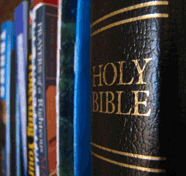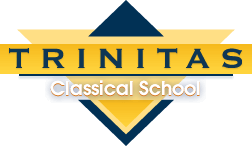As an intentionally ecumenical community, Trinitas Classical School finds its unity in the beliefs articulated in the Apostles’ Creed. This rule of faith is a confession common to Catholic, Orthodox, and Protestant traditions alike.
I believe in God the Father Almighty, Maker of heaven and earth.
And in Jesus Christ, His only Son, our Lord,
Who was conceived by the Holy Spirit, born of the Virgin Mary,
suffered under Pontius Pilate, was crucified, died and was buried.
He descended into hell.
The third day He rose again from the dead.
He ascended into heaven and sits at the right hand of God the Father Almighty.
From thence He will come to judge the living and the dead.
I believe in the Holy Spirit, the holy catholic Church,
the communion of saints, the forgiveness of sins,
the resurrection of the body, and the life everlasting. Amen

Additional Beliefs
In addition to the teachings concerning the Holy Trinity, creation, the incarnation and virgin birth of Our Lord Jesus Christ, and bodily resurrection confessed in the above creed, we also hold those truths believed by Christians of every time and place which are also most closely aligned with the mission of the school (e.g., Eastern Orthodox, Roman Catholic, and doctrinally conservative Protestant denominations). Among these, we mention specifically the following:
There is no salvation apart from Christ Jesus who said, “I am the way, the truth, and the life. No one comes to the Father except through Me.” (John 14:6)
The Holy Scriptures are “given by inspiration of God, and [are] profitable for doctrine, for reproof, for correction, for instruction in righteousness, that the man of God may be complete, thoroughly equipped for every good work.” (2 Timothy 3:16-17)
Concerning the teaching of origins, Trinitas Classical School affirms that God created everything out of nothing and that He created it good. From the earliest times, Christians have differed as to the age of the earth based upon the Genesis 1 account of creation; therefore, Trinitas teaches that God has created all things without speaking dogmatically about how He has done so (beyond the two affirmations identified above).
We believe that all human life is sacred and created by God in His image. Human life is of inestimable worth in all its dimensions, including pre-born babies, the aged, the physically or mentally challenged, and every other stage or condition from conception through death. We are therefore called to defend, protect, and value all human life (Psalm 139).
Trinitas Classical School adheres to Christian teaching on marriage and sexuality which is firmly grounded in the Christian scriptures and witnessed to by two millennia of Christian faith and practice, which holds that marriage is the exclusive union of one biological man and one biological woman, and that authentic marriage reflects the sacred unity that exists between Christ and His Bride, the Church (Ephesians 5).
We believe that God creates human beings for his glory and in his image, and that his good purposes for us include our personal and physical design as either male or female (Psalm 100:3, Genesis 1:27). Because we believe that human identity as male or female is an immutable part of God’s beautiful plan and not an expression of an individual’s autonomous preferences, we believe we are called to live out our lives in ways consistent with how we have been created.
The term “marriage” has only one meaning and that is marriage sanctioned by God which joins one biological man and one biological woman in a single, exclusive union, as delineated in Scripture. We believe that God intends sexual intimacy to occur only between a man and a woman who are married to each other. We believe that God has prohibited intimate sexual activity outside of a marriage so defined.
Practicing any form of sexual immorality (including adultery, fornication, homosexual, lesbian, or bisexual conduct, bestiality, incest, pornography, or any sexual conduct outside marriage) or advocating sexual immorality, is sinful and offensive to God and damages human community. (1 Corinthians 6:9-11)
Every person is the image of God and must be afforded compassion, love, kindness, respect, and dignity. Hateful and harassing behavior or attitudes directed toward any person should be repudiated and are not in accord with Scripture nor the policy of this school.
The statement of faith does not exhaust the extent of our beliefs. The Christian scriptures, as the inspired and infallible revelation of God, serve as the supreme source of truth and morality and are the standard of our teaching and code of conduct. For purposes of the school’s doctrine, practice, and discipline, our board of trustees is responsible for determining and developing the school’s policies and evaluating their implementation.
We believe that in order to preserve the mission and integrity of the school as an ecumenical community of Catholics, Orthodox, and Protestants, and to provide a biblical role model to the students, parents, and the community, it is imperative that all persons employed by the school must affirm the creed and support and teach in accordance with the additional teachings included in the Statement of Faith and abide by the Standards of Conduct. All enrolled students and their parents must acknowledge that the Statement is adopted by Trinitas and either affirm it or agree to support it.
 Because we are deliberately ecumenical, the forms of prayer, the songs, and the Bible translations that we use reflect beliefs common to Catholic, Orthodox, and Protestant Christians. Different devotional traditions (lifting the hands, bowing the head, making the sign of the cross, etc.) are respected, and we encourage teachers and students to pray as they are accustomed to do at home and in church.
Because we are deliberately ecumenical, the forms of prayer, the songs, and the Bible translations that we use reflect beliefs common to Catholic, Orthodox, and Protestant Christians. Different devotional traditions (lifting the hands, bowing the head, making the sign of the cross, etc.) are respected, and we encourage teachers and students to pray as they are accustomed to do at home and in church.
It is our view that beliefs specific to particular Christian denominations are most appropriately taught in the homes and the churches. When diverging beliefs and practices are appropriately discussed in the course of usual academic study, our teachers will answer from the viewpoint consistent with traditional, classic Christianity and the school’s mission and belief statements and aim to cultivate among our students an understanding and appreciation of both the variations within and the fundamental unity of the Christian faith.

